Fine Print: Melinda Cox’s Balanced Design
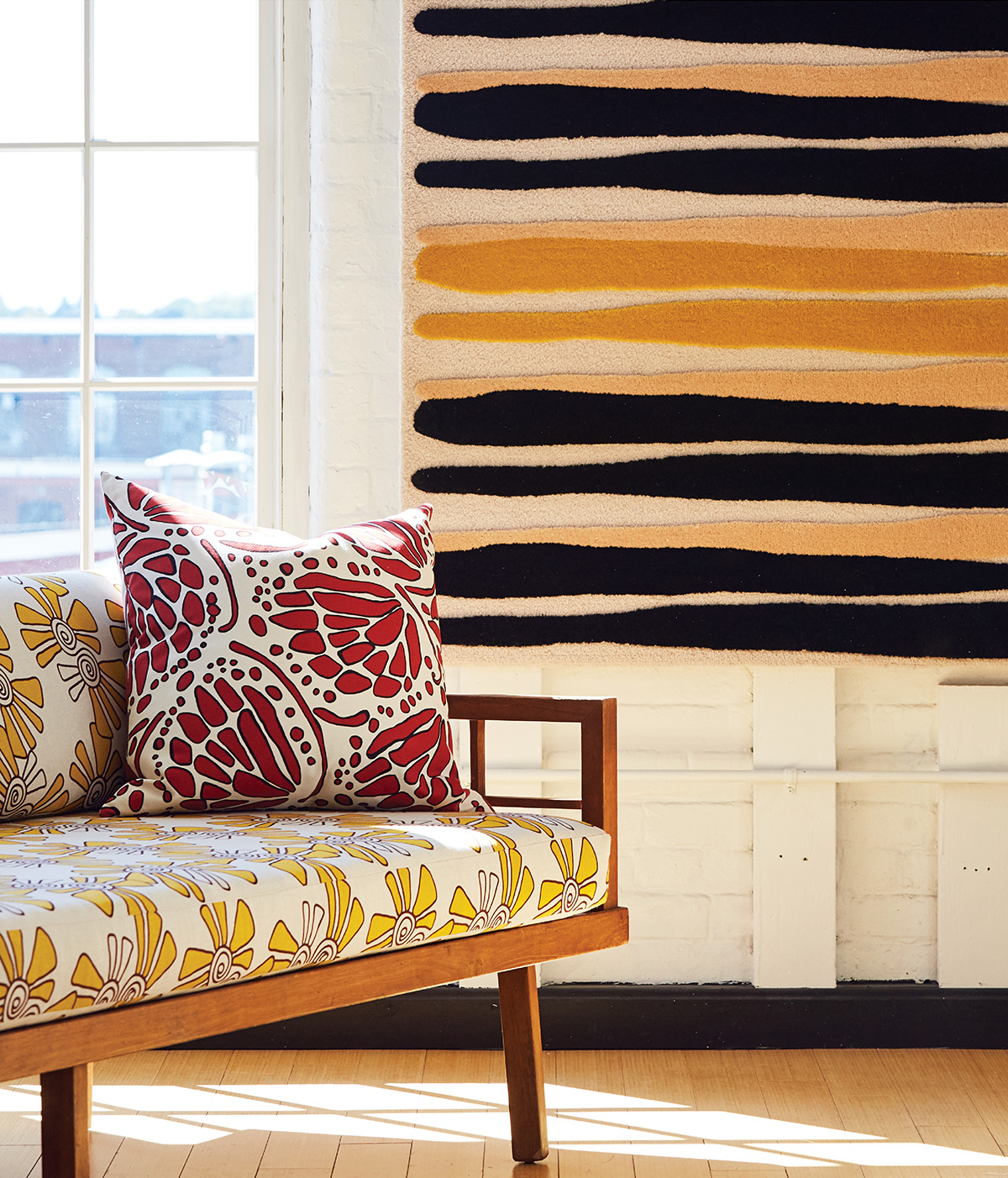
Photograph by Pat Piasecki
Standing in her sun-filled studio in eastern Rhode Island, Melinda Cox holds up one of her signature creations: a brightly patterned pillow, stuffed with fibers made from recycled soda bottles.
“This is one of my earliest designs,” Cox says, examining it closely. “I started out by appliqueing wool felt onto organic cotton flannel. It’s actually incredibly [eco-friendly].”
The pillow is just one of many such products that the graphic designer turned textile maven has dreamed up since launching her Pawtucket firm, Balanced Design, in 2003. For Cox, who prioritizes the use of sustainable and locally sourced materials, her company represents the ultimate merger of “good design with environmental responsibility.”
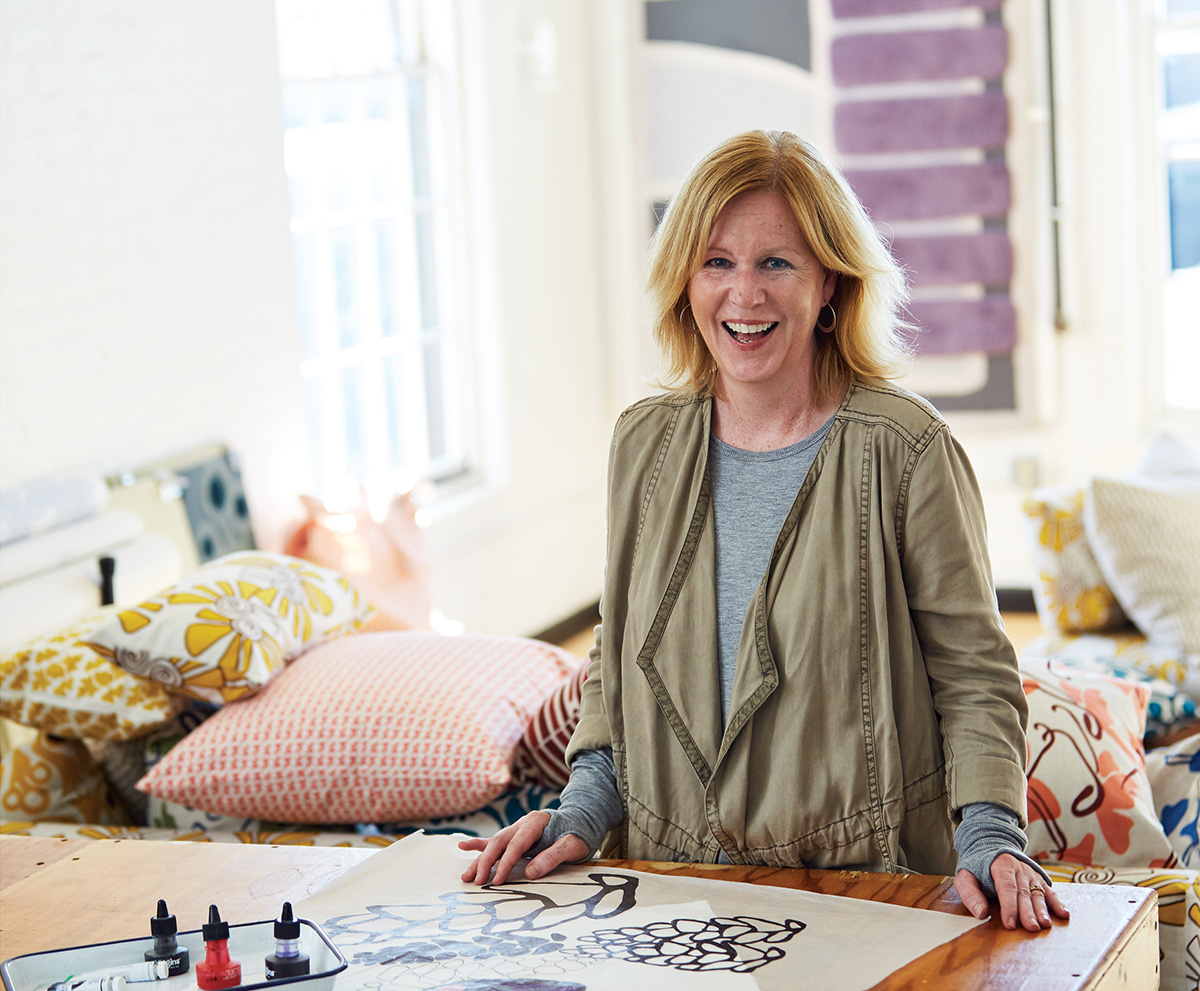
Cox in her Pawtucket studio. / Photograph by Pat Piasecki
In the early 2000s, the green-housewares landscape was very different—but right from the start, Cox had a vision for what it would take to stand out: “Back in those days, all the [eco-friendly] products on the market were beige,” she says. “As a designer, I wanted the ability to use color.”
Cox was inspired to launch her prismatic, one-woman operation after a 2001 trip to Paris, a city seemingly more attuned to sustainable living practices than its American counterparts. Shoppers carried their purchases in reusable bags. Drivers favored small cars over gas-guzzling SUVs. To Cox, a native New Englander raised in a family that valued recycling and farm-to-table meals long before those ideas were trendy, it seemed like a better way to live—and operate a business.
Since the inception of Balanced Design, Cox has channeled those ideals into each product she creates. Her vibrant textile patterns—inspired by everything from midcentury artists like Rothko and Calder to naturally occurring shapes and forms—grace decorative cotton and linen pillows, wool area rugs, and ultra-handy canvas totes—all of which are manufactured using organic and/or recycled materials in Massachusetts and Rhode Island.
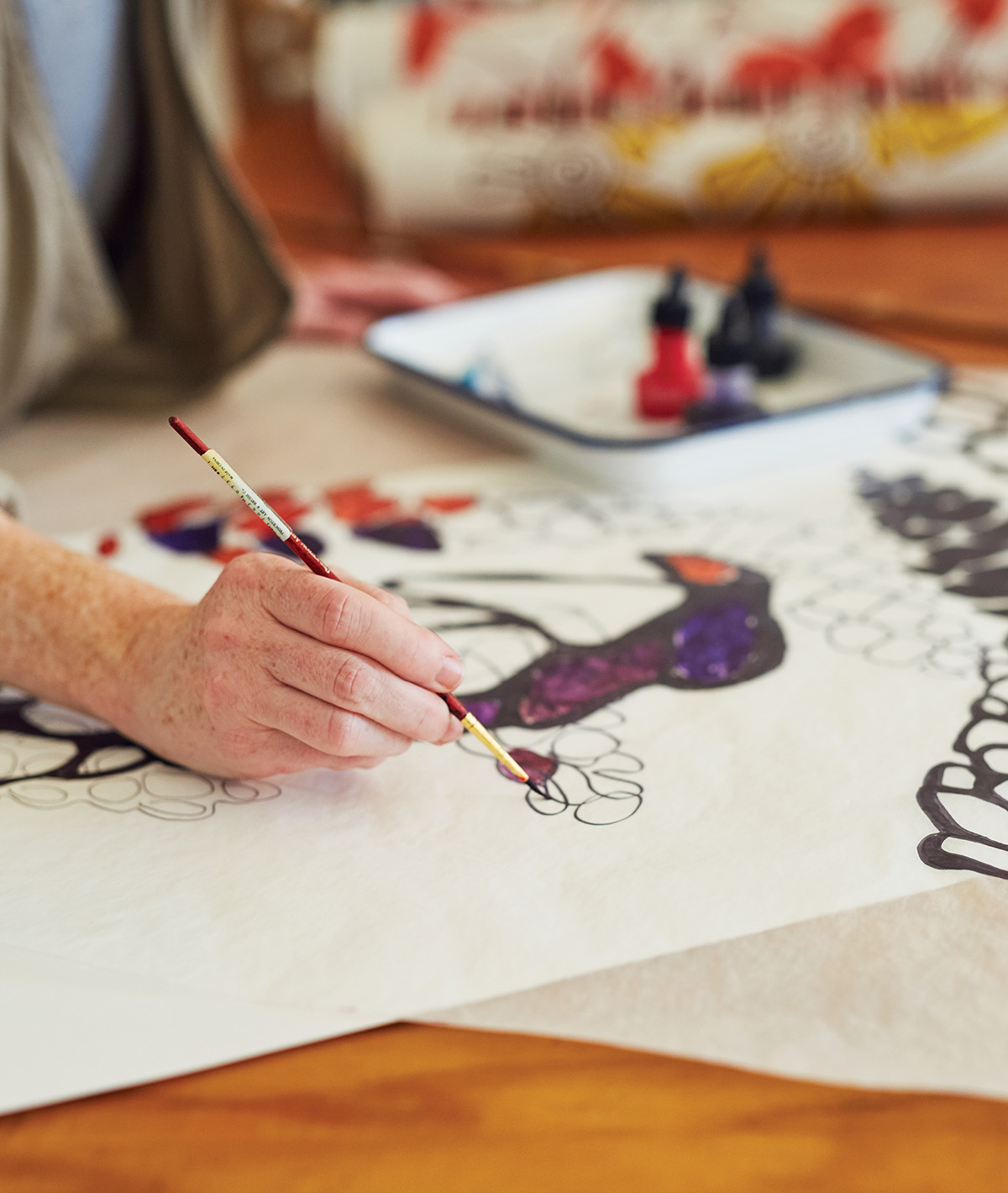
Cox uses India ink to handpaint her patterns. “The beauty is in the imperfection,” she says. / Photograph by Pat Piasecki
“I call myself a minimalist pattern designer, which is funny because pattern is all about repetition,” Cox says. “But I try to strip away as many elements as possible. I’m not interested in visual clutter.”
Cox kicks off her design process by using Sharpies to sketch patterns. Once she’s satisfied with a pattern’s form, she uses tracing paper to re-create it and establish what she calls “the repeat.” When a full repeat, or “tile,” results, Cox handpaints it before sending it to the screen-printing team for production at the nearly-100-year-old Griswold textile mill in Westerly.
The two-person manufacturing team then uses traditional 54-inch screens to hand-apply water-based ink to the various natural fabrics. After the dye has set, the colorful fabrics are sent across state lines to Fall River to be sewn into pillows, totes, and rugs. The finished products range in starting price from $68 to $288. “It’s human beings—our hands are involved in all of it,” Cox says. “I love seeing the end result.”
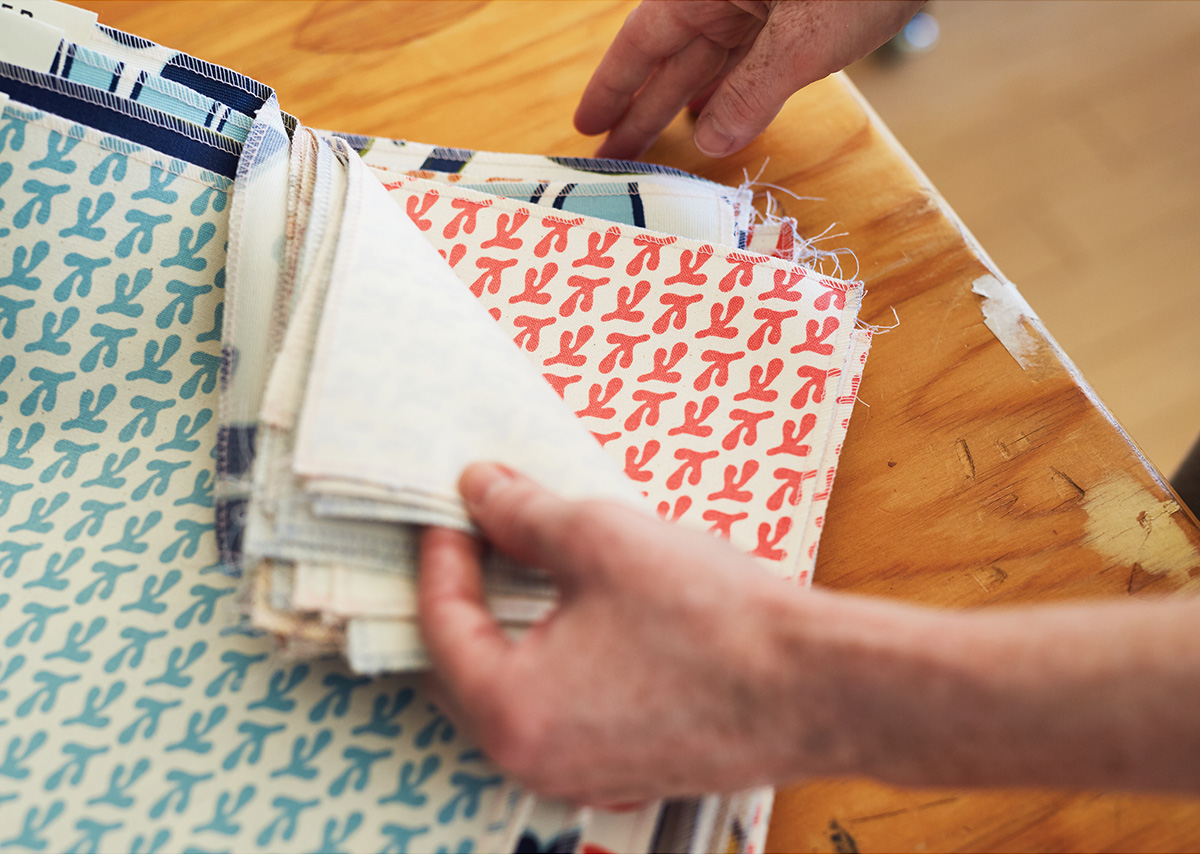
The designer was inspired to create this pattern, “Birds’ Feet,” after spotting avian footprints on the beach. / Photograph by Pat Piasecki
So do her clients. As one of the first entrepreneurs to stake out a niche in the green-home-décor market, Cox has been very successful in selling her in-demand wares to customers directly via her website, balanced-design.com. She’s also had the opportunity to partner with numerous companies on custom projects. In 2014, for example, Balanced Design teamed up with Hunt Yachts—the only remaining boat builder in Rhode Island—to create bespoke fabric for one of its vessels. More recently, Cox flexed her interior-design muscles by collaborating with a New York–based architecture firm on a line of pillows for a hotel slated to open in Buffalo next spring.
Cox says her favorite part of the job remains the design process itself. Although she releases new patterns just once a year, Cox is always on the hunt for inspiration and ways to join forces with others in the industry.
“A designer is always solving a problem, even if there’s not a specific client in mind. Focusing on being as green as possible gives me a whole series of guardrails,” she says. “The process is just exciting.”

Cox’s designs are brought to life at the Griswold textile mill in Westerly. / Photograph by Pat Piasecki

Stacked pillows showcase Cox’s bold designs. / Photograph by Pat Piasecki
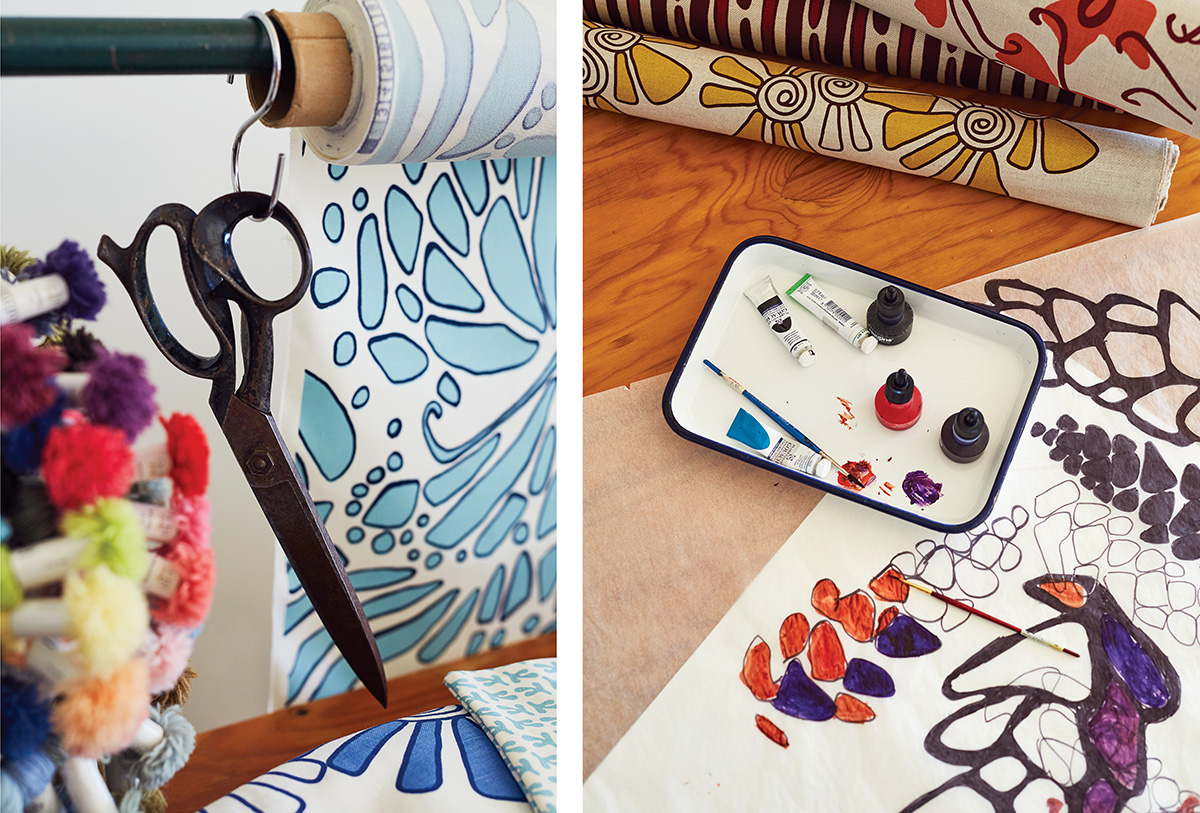
From left: Wool yarns, or pom sets, indicate colors for rug production; the designer handpaints her patterns to indicate breaks in color for the screen-printing team. / Photographs by Pat Piasecki

Rolls of fabric rest against a studio wall. / Photograph by Pat Piasecki


